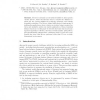Free Online Productivity Tools
i2Speak
i2Symbol
i2OCR
iTex2Img
iWeb2Print
iWeb2Shot
i2Type
iPdf2Split
iPdf2Merge
i2Bopomofo
i2Arabic
i2Style
i2Image
i2PDF
iLatex2Rtf
Sci2ools
136
click to vote
SEBD
1997
1997
Indexing Metric Spaces with M-Tree
M-tree is a dynamic access method suitable to index generic “metric spaces”, where the function used to compute the distance between any two objects satisfies the positivity, symmetry, and triangle inequality postulates. The M-tree design fulfills typical requirements of multimedia applications, where objects are indexed using complex features, and similarity queries can require application of time-consuming distance functions. In this paper we describe the basic search and management algorithms of M-tree, introduce several heuristic split policies, and experimentally evaluate them, considering both I/O and CPU costs. Results also show that M-tree performs better than R∗ -tree on highdimensional vector spaces.
Dynamic Access Method | M-tree Design Fulfills | SEBD 1997 | SEBD 2007 | Time-consuming Distance Functions |
Related Content
| Added | 01 Nov 2010 |
| Updated | 01 Nov 2010 |
| Type | Conference |
| Year | 1997 |
| Where | SEBD |
| Authors | Paolo Ciaccia, Marco Patella, Fausto Rabitti, Pavel Zezula |
Comments (0)

